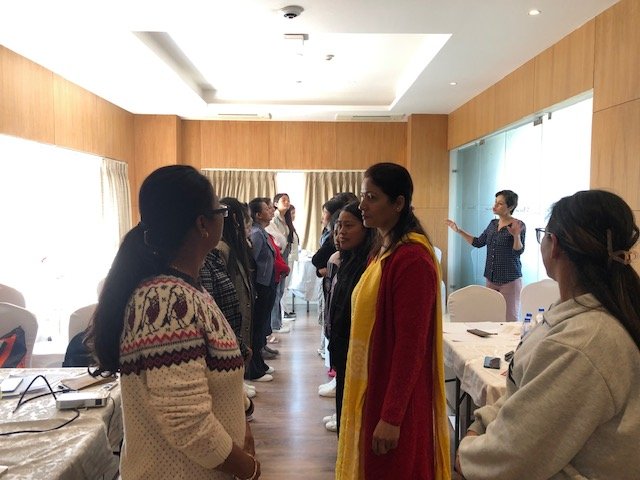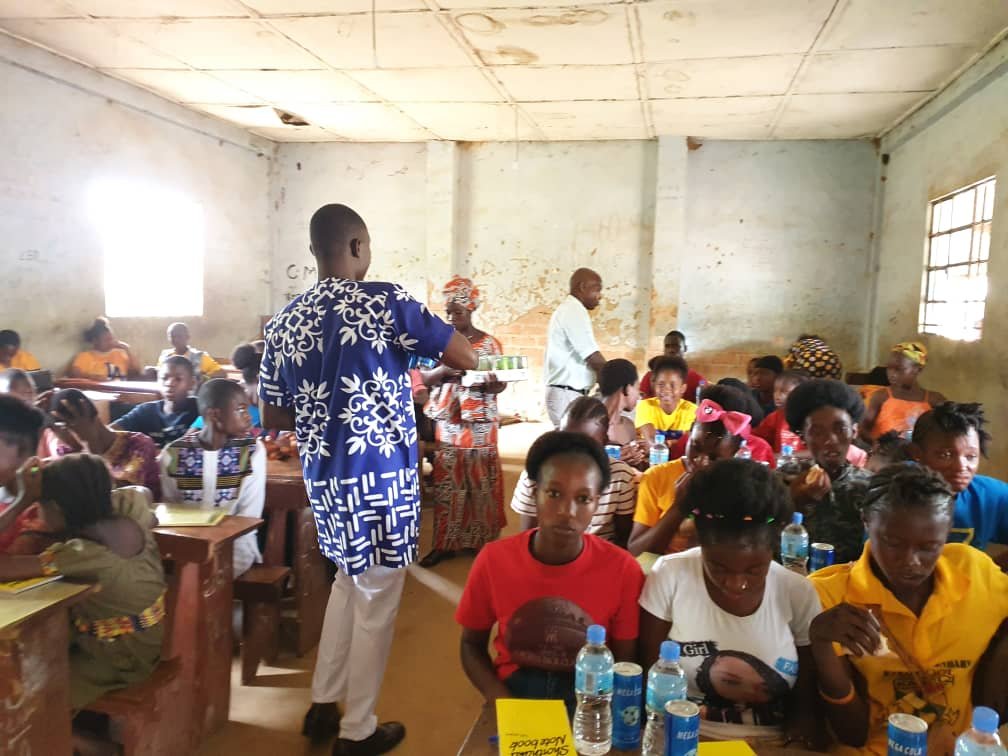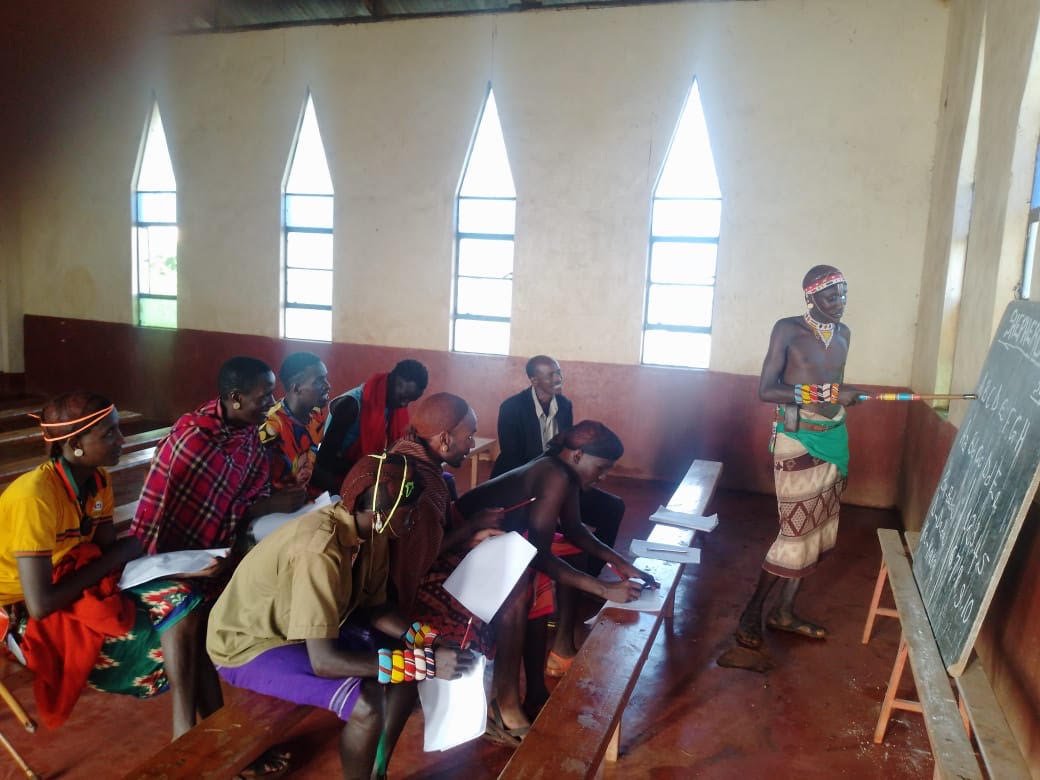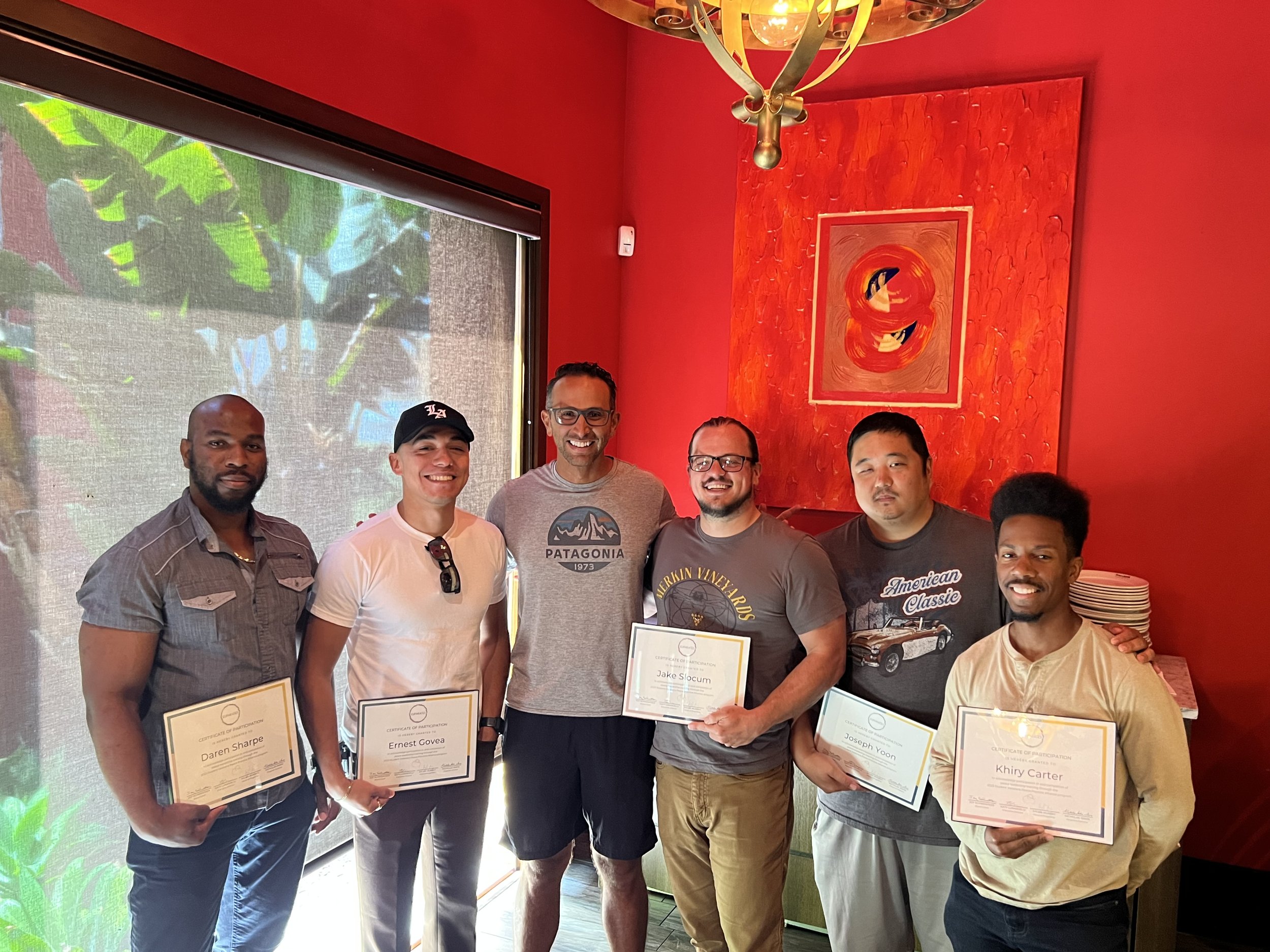Peace Practice Initiatives
After completion of the 2023 Peace Practice Alliance (PPA), members of the cohort amplified their learnings from the PPA through incredible community peace initiatives. 23 members of the cohort implemented 21 initiatives in 12 countries, and 2 projects spanned multiple countries. Some initiatives are complete while others are ongoing, and we are excited to provide an overview on the immense work happening around the world!
Trainings or workshops led by 2023 PPA members reached a collective total of 1,292 direct participants. Advocacy campaigns and other projects directly engaged a total of 485 participants. Training and workshop participants reported greater understanding and confidence in topics covered, which included and was not limited to personal peace practice, empathy, gender equality, conflict resolution techniques, peace education, peaceful approaches to gender-based violence (GBV), and more. Awareness campaigns and other initiatives reported reduced stigma, improved community support, increased engagement and action from community members and participants.
2023 cohort members also shared an abundance of their own personal growth and learnings about collaboration, relationship building, trust, responding to community needs, leadership practice in action, and the potential for change. Browse below for more information about the inspiring peace practice initiatives around the world!
The following descriptions are compiled and written by 2023 PPA leaders, Lisa Hilt, and the Euphrates team. Several 2023 PPA initiatives are awaiting completion and are not listed here.
Adaptation and Piloting Peace Education Materials Among Estonian Educators and Youth Workers
Estonia | Karolin Mäe
-
Karolin adapted the PPA program into a hybrid university-wide elective course for Estonian educators and youth workers, offering modules on culture and intercultural dialogue, and peace and global citizenship education. The course included in-person sessions, an online learning platform, guest lectures, study visits, and collaborative project presentations. 142 learners enrolled in the course, with 22 men and 120 women, more than half of the participants were experienced educators (social pedagogues, vocational educators, youth workers or andragogues), and 30 participants were student-teachers. Of the 133 participants who completed the course, 70% embraced the role of being a peacebuilder, 90% found ideas and theories to be used in their context; with youth workers finding restorative practices most useful and teachers finding nonviolent communication most useful. Initially, only 15 learners reported that they had implemented peace education, and at the end of the course, all 133 learners who completed the course reported greater understanding and confidence in their ability to use peace education strategies in their communities.
Awareness Campaign to Prevent and Combat Stigma and Discrimination Against Albinism
Rwanda | Jean Bizimana
-
In January 2024 a public awareness-raising event was conducted in Rubavu District, Bugeshi Sector, aimed at preventing and combating the stigma and discrimination experienced by people with albinism through community engagement, education, and advocacy. The event gathered 452 people, including local residents, community leaders, community health workers, youth, faith-based organizations representatives, school representatives, and persons with albinism. During the event, community family volunteers spoke to raise awareness in breaking the generational cycle of hatred and prejudice. Local organizations committed to creating a platform for networking and sharing information on the improvement of the rights of persons with albinism. Faith-based organizations and local government representatives committed to enhancing advocacy and actions to respond to and protect the rights of persons with albinism. A press release was published to increase awareness of the rights of persons with albinism. The event helped to reduce stigma and stereotypes, dispelling myths and misconceptions surrounding albinism, and following the event head teachers reported an increase in school enrollment and attendance rates of people with albinism.
Building Youth Resilience to Violence and Crime Through Sensitization and Counseling Services
Nigeria | Glory Uke Kehinde
-
Glory led an initiative aimed at building youth and local resilience to violence and crime, and exploring the role of art and culture as vehicles for youth engagement and empowerment. The initiative gathered 40 youth from different backgrounds. A workshop was provided focused on understanding risk and protective factors to youth violence and crime and effective approaches to prevention interventions (e.g., informal education, life skills training, youth mentoring programs, family support, positive parenting, sport-based interventions). In addition, the youth involved were provided with one-on-one counseling services. This was the first time these youth received such training in their community. Participants reported having increased understanding and consideration of their views of conflict, increased ability to view problems more objectively, increased knowledge on healing from trauma, and a more optimistic outlook on ending crime and violence in their neighborhood. Glory is working on sustaining the initiative by recruiting supportive volunteers to continue the work.
Ludenesia: Leadership Training
Indonesia | Ratu Bintang Assyifa Arweys
-
With a volunteer team of friends, Bintang hosted a leadership training with students across two middle schools in Jakarta. The training reached 73 students, over half of whom were female. Through storytelling, team building exercises, and sports, the training focused on empathy, teamwork, and gender equality to build a strong student culture and improve student leadership. During and after the training, students shared powerful reflections on lessons learned including but not limited to having the power to address conflicts compassionately without resorting to fighting, recognizing the ability and capacity of their female peers, and feeling closer to each other and less alone. Students also shared they would begin actively utilizing these skills in their roles in their respective Student Councils.
Empower Her Workshop: Elevating Women’s Leadership | Nepal | Sara Safari
-
Hosted by Climb Your Everest (CYE), founded and led by Sara Safari, the objective of the Empower Her workshop was “to equip Nepali women with the knowledge, skills, and resources necessary to empower themselves, foster gender equality, and drive positive change within their communities” (CYE, 2023). Sara and her team held three leadership skills workshops in three different cities in Nepal. Each workshop was two-days and included mostly teachers and principals of the schools. A total of 200 people participated in the workshops. Over 90% of participants reported change in their lives and learning new skills that they can apply in their daily lives. Sara plans to continue the initiative, and has more workshops in Nepal scheduled.
The Future Starts With Me
Sierra Leone | Joseph Sesay
-
Joseph developed a multi-pronged initiative aimed at supporting young people to mitigate issues of drug abuse, early teenage pregnancy, and low quality education and embark on a better future. The initiative worked with young people between 10-25 years old in the Northern Province, Koinadugu District, Kabala. The initiative involved education on self-compassion and self-love, network building amongst schools and communities, student mentorship support, and a referral-program to support victims of drug abuse, domestic violence, and sexual assault. The Future Starts With Me launched with two campaigns gathering 200 students across four schools. Areas of impact amongst students who participated included increased knowledge about the risks and consequences of drug abuse and early teenage pregnancy, improved attitudes towards healthy lifestyles and positive behaviors, and increased awareness among teachers and community leaders on the importance of quality education.
Honar Book Club
Afghanistan
Mahdia Yousufi
-
The Honar Book Club is an online book club aimed to offer Afghan students a gateway to broader perspectives through literature, enhancing critical thinking, language skills, and a sense of global community. The initiative's ultimate goal is to nurture a community of informed, engaged, and inspired learners, ready to contribute positively to society. In its first pilot, Honar Book Club brought together 33 youth from Afghanistan, including 30 young women, for two online sessions a week over the course of a month. The sessions covered comprehensive discussions of four literary works, and insightful conversations with guest speakers to enhance personal peace and leadership. Participants reported positive feedback on the experience, and as a result one participant began their own initiative to distribute books amongst youth in Afghanistan. Honar Book Clubs aims to be a sustained effort, broadening literary selections, interactive activities, and engaging more youth.
Restore Peace at Home with NVC by Radiate Life
Ukraine | Anastasiia Dieieva
-
The mentoring program of Radiate Life aims to empower and help women-leaders from Ukraine, who fled home because of the war, to restore their life and build their life strategy. This initiative reached 44 women, and involved a workshop on inner peace, a series of webinars on regenerative leadership, asset-based partnerships, and nonviolent communication (NVC), and 1-1 mentoring sessions (85 in total). The mentoring program specifically aims to build a sense of sisterhood, restore inner peace, and enhance skills needed to help cope with new life challenges, with an emphasis on NVC. While the women who participated are now spread across 20 different countries, they regularly convene to support each other and have cultivated a trusting, supportive community. After four months of the mentoring program, 95% reported a greater understanding of nonviolent communication, 75% reported starting to use NVC in their personal and professional lives, and 99% integrated mindful practices into their daily routine. They have also developed a list of initiatives aimed at supporting and making a positive impact in their home communities in Ukraine.
Light of Peace
Afghanistan
Edriss Behraj and Rukhsar Khairi
-
As women and girls in Afghanistan are not able to attend school or go to work, the Light of Peace initiative aimed to bring hope to young women, and support them in their life trajectories, personal peace practice, and leadership skills. This initiative brought together 20 young Afghan women for seven online sessions focused on integral peace leadership, with two of these sessions collaborating with fellow PPA participants and their communities in Nigeria to share ideas and experiences about peace. The initiative also invited the participants to create and lead peace leadership exercises at a local orphanage, practicing their own leadership in peace education through art, drawing, poems, and interactive activities with children. More than 85% of participants reported a significant boost in their self-assurance and their ability to effectively implement peace education. The initiative also significantly bolstered participants’ motivation and hope in shaping and strategizing their future trajectories, and increased their personal peace practices.
The Changemakers of NISA | Multi-Country
Obi Onyeigwea and Dima Mahjoub
-
Obi and Dima collaborated to launch an online training bringing together individuals from Nigeria, Iraq, Syria, and Afghanistan. The training brought together 15 participants and followed the integral peace leadership modules of the Peace Practice Alliance from personal to global peace practice. 100% of participants reported greater understanding of peace leadership, and 86% reported greater confidence in applying it. Most of the female participants reported confidence in topics such as interpersonal practice and are ready to engage their communities as peace builders and leaders of change. Some participants have already started to engage students in schools, facilitating peace clubs and games to create interpersonal relationships, to build connection and care, and radical self-care and awareness.
Night School for Rendille Morans/Shepherds
Kenya | Nelly Waiya
-
Nelly designed and led an initiative to support 25 moran herders from Kituruni, Marsabit County in Kenya, to participate in a night school for six months. The areas of learning focused on basic literacy skills such as numbers, letters, and basic peacebuilding and conflict transformation skills such as dialogue in conflict resolution, to change from negative moran cultural traditions (cattle rustling, early marriages and banditry) to embracing diversity, education and alternative sources of livelihood. As a result, the morans who participated can read basic words, more effectively use mobile phones to write messages, make money transfers, and write simple text messages The morans can also write their names and append their signatures, which they could not do previously. They have boosted their confidence to participate in community activities. By equipping them with basic peacebuilding principles and skills, they are able to be peace ambassadors among the youth in their communities. Within the period of implementation, there were no cattle raids in the area, indirectly attributed to the project support and change in attitudes and conflict transformation. After the night school morans are attending community public meetings and advocating for their issues, have organized a welfare group to champion their issues and create a change in the culture of violence, and several aim to continue formal adult learning courses to further their education.
Student Veteran Peace Practice Alliance Program | United States | Nick Irwin
-
At Chapman University in California, Nick Irwin developed a hybrid model of the Peace Practice Alliance program for five enlisted male student veterans from different ethnic backgrounds. They engaged in all modules of the PPA, in-class discussions, healing circles, personal peace practices, and experiential activities. 100% of participants reported greater understanding or awareness of peace leadership topics covered, and greater confidence in their ability to apply what they learned. The combination of each of their personal growth and new friendships created led to their collective action to improve conditions and experiences for student veterans on campus. This resulted in two key partnerships developed on campus to provide military-connected students access to free courses and certificates to help them advance post-college, and to establish a Student Veteran Lounge on campus as a safe space for students to congregate, study, and be their authentic selves, and advance the student veteran Chapter program on campus. Together they have now increased membership, built a community of belonging for student veterans to not feel alone, launched a mentoring program, and created the first student-veteran focused segment of orientation for new students. This will be an ongoing effort.
United in Hope-United for Humanity
Multi-Country, Online | Kaleem Hussain
-
Hosted by Kaleem Hussain, United in Hope-United for Humanity was an online event-workshop that convened peace advocates and practitioners from NGOs, charities, and faith representatives to discuss major challenges and obstacles encountered when providing assistance, relief, and aid in conflict zones. The event gathered approximately 40 people, and increased attendees' understanding and awareness of the multi-pronged challenges humanitarians face when working in conflict zones. The event addressed the topics of peacebuilding and hope through a blend of academic, theoretical, interfaith, humanitarian, and practical approaches.
Social Integration Initiatives
Uganda | Rashidah Nampiima
-
The Social Integration Initiative is an ongoing effort by Rashidah. For this initiative, they conducted peace training sessions with nursery and lower primary children at different schools in the region of Rwamwanga refugee settlements in Kamwenge District. They also hosted sports sessions with youth from different backgrounds across the local and refugee populations. Through these sessions, the initiative directly involved 400 individuals. Reported impact from the initiative in the Rwamwanga settlements included increased knowledge in peace and conflict resolution, with 85% individuals reporting greater understanding and 82% reporting greater confidence in applying the practices in their lives. Incidents of conflicts and fights reduced by 50% within the school premises. Teachers and parents reported observations that children were more empathetic and understanding towards others after the training, noting increased cooperation and respect among children from different backgrounds; and 90% of participants in the sports sessions reported feeling more connected to peers from different backgrounds.
Re-Imagining New Communities
Kenya | Sahlim Charles
-
Hosted by his organization Re-Imagining New Communities, Sahlim and his team focused their efforts on deepening their work in their Children-Led Community Peace Labs program (CLCP-Labs) and their Faith4Peace program. As part of their CLCP-Labs program, they hosted a 2-day workshop for 12 educators across 4 primary schools in informal settlements in Nairobi. Educators were trained on conflict resolution skills, promoting peaceful coexistence and dialogue as essential tools for resolving disputes within their school communities. After the workshop, the participants established CLCP-Labs in their schools which Sahlim’s team visits on a weekly basis, supporting peace activities within the schools and peer mentoring across schools. Through their Faith4Peace program, the team provided support to pastors and church leaders across 3 churches in Nairobi to enhance and streamline conflict resolution mechanisms within their churches and organizations. Data gathered across the two initiatives shows a 70% increase in participants’ understanding of conflict resolution techniques, 85% reporting feeling more equipped to manage conflicts constructively. Support for the pastors has led to reduction in conflicts between and among the leadership and congregation, and online mentorship sessions for teachers led to 60% increase in integrating peacebuilding concepts into curricula. Both of these are ongoing initiatives within Re-Imagining New Communities.
Integrating Peace Leadership in Enhancing Women’s Capacity to Prevent and Respond to Gender Based Violence
Kenya | Nickson Magak
-
To address high levels of gender-based violence (GBV) in Kendu Bay, Homa Bay County, Nickson developed a four-month initiative, as part of a sustained effort, to train and sensitize 20 participants on peace leadership and gender-based violence prevention. Participants included peer educators, service providers, and Beach Management Units (BMUs) who all have direct touch points within the local community. The initiative also included a peer-to-peer mentoring program. 90% of participants reported greater understanding of peace leadership, gender-based violence, and peaceful approaches to GBV prevention, control, mitigation, referrals, and management within the community. 85% of participants reported greater confidence in their ability to apply peace leadership practices to their GBV work. The community is already experiencing these practices in action when addressing active cases, and will continue this as a sustained effort.
Unveiling Struggles and Seeking Solutions: In-Depth Study of Challenges Faced by LGBTQIA+ Individuals in Nigeria
Nigeria | Salome Irimekyen Samuel
-
As a launch to their organization Pride of Sheba, Salome and their team conducted an in-depth study of challenges faced by LGBTQIA+ individuals. This involved a literature review on mental health of LGBTQIA+ individuals, lack of support provided to the community, common misconceptions, and challenges of isolation, violence, prejudice and more faced in Nigeria. The team also conducted surveys to gather quantitative data, hosted in-person focus group meetings with 60 participants to gather qualitative data and stories, and conducted 10 key informant interviews. All of these findings both provide valuable research insights and contribute to shaping the organizations short and long-term goals to empower the LGBTQIA+ community, collaborate with NGOs, and develop its advocacy pathway. This initial research study has been foundational in cultivating deep partnerships, particularly with the Gosa 1 community, fostering mutual respect and a shared commitment to addressing the challenges faced by the community members. It also established collaboration with the International Centre for Rights to Advocacy and Health (ICARH), with whom they are exploring joint activities to support LGBTQIA+ communities through advocacy, health services, and capacity-building initiatives. Further, it provided a safe, trusting environment for queer people in the community to speak freely about their identities, share about their struggles, and to feel heard, secure, supported, and gain back self-esteem.
















